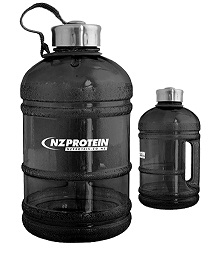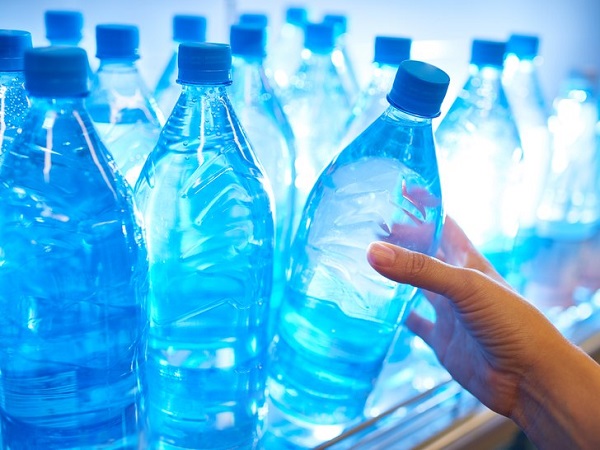
Water is the most common element in our body and makes up about 60% of our total weight. It's in all body tissues, cells, organs, and makes up about 3/4 of our brains.
Our digestive system uses about 1/3 of our water in our body to digest and absorb food every day, and our bodies lose water through perspiration, breathing, urine and faeces - even when not exercising.
Water is considered to be essential because the body requires more than can be obtained from food alone. As we only obtain about 22% (according to this study in the US) of our daily water requirements from the foods we eat, the rest must come from drinking fluids.
In general, men need around 3 litres of water daily and women around 2.2 litres from total intake including food.
Exercise increases the amount of water lost through sweat and perspiration. It varies depending on the individual and activity level but overall to maintain hydration and normal function adequate consumption of water is critical - especially for sports nutrition, bodybuilding, fat loss, and well-being.
Dehydration occurs with a loss of just 1-2% of total body water. Even slight dehydration can trigger short-term memory confusion, difficulty focussing, and trouble with basic math.

Benefits of Drinking Plenty of Water
Water plays many vital roles within the body. It:
- Regulates body temperature
- Helps with the digestion and absorption of food
- Acts as a transporter of nutrients
- Eliminates waste products from the body
- Lubricates joints and internal organs
- Provides structure to cells and tissues
- Creates saliva
- Can reduce fluid retention
- May help to relieve constipation
- Can help to burn calories and with fat loss
More Water For Muscle
Muscle mass is made up of 70-75% water and fat is made up of 10-40% water.
A loss of 2% body water can significantly reduce muscle strength and performance. These include reduced endurance, increased fatigue, reduced motivation and an increase in perceived effort.
Endurance athletes can lose 6-10% of body water stores during intensive exercise and physical performance can be significantly affected.
Rehydration can reverse this and also reduce oxidative stress from exercise.
After intensive exercise fluid intake may be inadequate to offset fluid deficits because mild to moderate dehydration can persist for some hours after the conclusion of the exercise. Exercise undertaken in hot temperature also requires more fluid replacement than in cold temperature.
Muscle and exercise need a higher fluid intake, so drink more water to stay hydrated and perform at your best.

More Water For Fat Loss
Higher water intake can increase feelings of fullness which can lead to less calories consumed. Drinking water 30 minutes before meals has been shown to reduce energy intake.
Drinking more water can also boost metabolism and burn more calories. Drinking 500ml of water has been found to increase calorie expenditure by around 24-30% for at least 60 minutes after consumption.
Drinking 2 litres of water per day has been found to increase energy consumption by 400kJ per day. In this study of dieters, those who consumed 500 ml of water before meals lost 44% more weight than those who consumed no water before meals.
Cold water can burn more calories than warm water too because the body creates a small thermogenic response (ie, uses some energy to warm it).
Is Too Much Water Bad?
Drinking too much water (ie, more than the body excretes through perspiration and urine) can cause dilution of blood sodium levels. This condition is called hyponatraemia and can be fatal in rare cases.
Symptoms include nausea, headaches and confusion and in more serious cases vomiting, seizures, comas, and even death. However you'd have to drink a significant amount of water in one sitting for this (litres).
Over-hydration is rare and dehydration is far more common.
Best Type of Fluid to Drink
Water isn't the only drink that will keep you hydrated. Any beverage that contains water will count towards your daily intake.
Other foods and drinks can keep you hydrated and it's a myth that caffeinated beverages, such as coffee and tea, are diuretic and dehydrating - studies have found no significant dehydrating and diuretic effects in these types of drinks.
Plain water is a better choice than sugary and/or energy drinks which can cause weight gain and inflammation and increase risks for developing diseases such as diabetes.
Water Content of Common Foods
Food |
Average Water Content |
| Water |
100% |
| Strawberry, watermelon, lettuce, cabbage, celery, spinach, pickle, milk (fat free) |
90-99% |
| Apple, grape, fruit juice, orange, pear, pineapple, broccoli, (cooked) |
80-89% |
| Shrimp, cottage & ricotta cheeses, corn (cooked), potato (baked), avocado, banana |
70-79% |
| Salmon, chicken (breast), legumes, pasta, ice-cream |
60-69% |
| Feta cheese, beef (minced), tenderloin steak (cooked), hot dogs |
50-59% |
| Pizza |
40-49% |
| Bread, cheddar cheese |
30-39% |
| Cake, biscuits, pepperoni |
20-29% |
| Butter, margarine, raisins |
10-18% |
| Nuts - walnuts & peanuts, peanut butter, cereals & crackers, tacos, pretzels, chocolate chip cookies |
1-9% |
| Oils (fats), sugars |
0% |
Hydrator Jug
Our Hydrator Jug product (pictured) makes it easier to stay hydrated.
It's easier to drink water when you have a big jug of it handy and ready to go.
Hydrators hold a big two litres of water and make it easy to take along to the gym, away on day trips and camping trips, or for a day at the beach. They also work well in the car or at work.
Verdict
Drink more water. Exercise increases water intake requirements.
As a rule of thumb you should always drink enough water to quench your thirst when you experience feelings of thirst.
If you struggle drinking water, try adding a flavoured BCAA to your drink and sipping it while in the gym, or a flavoured hydrolysed collagen while at work. These products make water easier to drink and increase your intake.
